Spoilers are a given, read at your own risk.

Watching Katanagatari was a hollow experience. Not that the story was particularly dark, or tragic – it was those two things, but those weren’t the main aspects that made me want to strangle the show by its throat. No, Katanagatari was hollow in the more metafictional sense. Its story was essentially, meaningless. Twelve 45 minute long episodes all built up to nothing. Plotlines weren’t resolved. Narrative threads got snipped shut. And it wasn’t just the ending. Throughout the entire series the writers had been purposely setting up expectations for where the story would go and then breaking them in the most cruel and sadistic manners as possible.
Take for example, a fight between Shichika(the main character) and the strongest swordsman in the country (Sabi Hakuhei). This fight had been hyped for three straight episodes and everyone in the story had cooed about how Sabi Hakuhei was the greatest and that Shichika would have trouble beating him, etc, etc. And then the episode of their fight came. It happened offscreen. We didn’t see a single frame of it. At the end of the episode Shichika was talking about how epic the fight was. By that time I was holding my head in my hands and thinking, ‘they’re definitely doing this on purpose’.
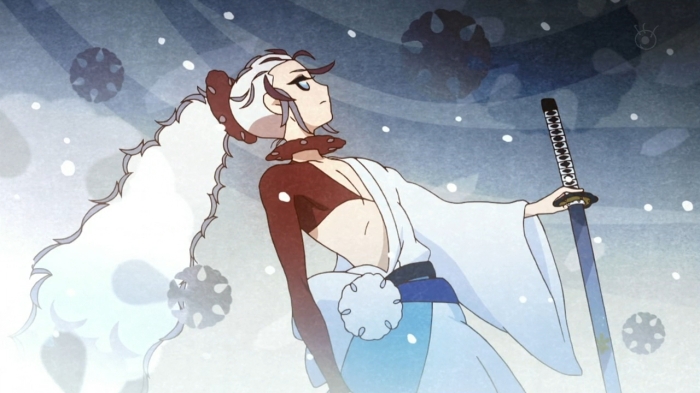
Although Katanagatari is advertised as a romance/samurai story, and although to be fair it does fulfill many of its genre tropes, it is still very very meta. Characters sometimes break the fourth wall regularly and reference the fact that they exist inside a story. It can become very annoying at times. At one scene, I was watching them hike through the desert, on their way to an abandoned mansion to collect the second of their twelve deviant blades, and then suddenly Togame(the other main character) couldn’t shut up about how some guy’s dialogue would be hard to write. I thought I was watching a romantic samurai story. Since when was it a postmodern romantic samurai story? That’s the problem when you bring in meta concepts into the field – either you’ll sound super self-indulgent or you’ll kill the immersion completely.
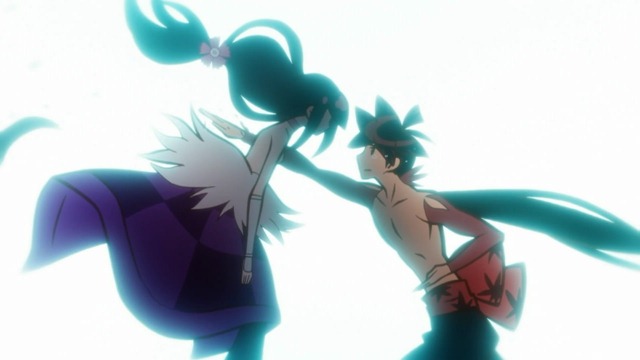
But in Katanagatari’s case, its meta atmosphere had a point. Despite all its idiosyncrasies and inconsistency, Katanagatari did end up having a message to bring across. The moral of this entire clusterfuck of a story was simply, “If you follow the path set for you by others, it will never work out.” Basically, it can be shortened to, “Everything you do might be meaningless.”
And meaninglessness is exactly at the heart of Katanagatari.
The tragedy of the Maniwa Corps
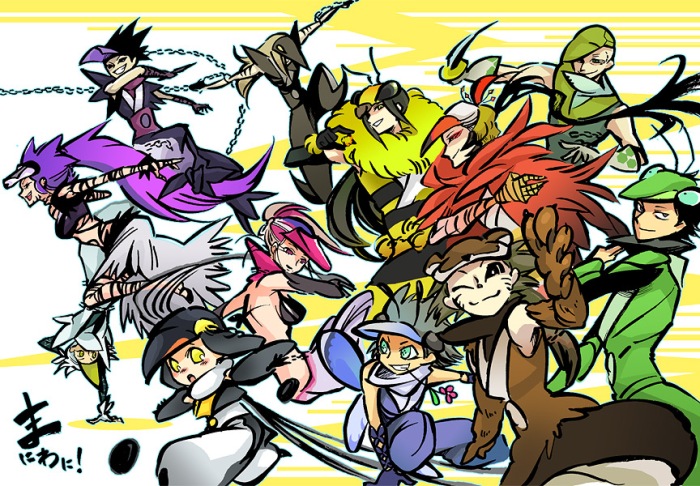
There’s a group of secondary villains in the anime, twelve of them, called the Maniwa Corps, ninjas who want to stop our hero’s journey in collecting the Twelve Deviant Blades and take the swords for themselves. The first one appears with a bang in the very first episode, boasts of his abilities and skills, and actually manages to give Shichika a fairly hard time before he in unceremoniously killed.
That is the last time a Maniwa ever did anything.
The second Maniwa appeared in the second episode. He had a grand total of thirty seconds screentime and one line of dialogue before getting bumped off. And he wasn’t even bumped off by the main character.
The third Maniwa appeared in the third episode. He had one small scene in which his psychotic nature established him as a clear and present threat. In the next scene, he was dead in ten seconds, and again, it wasn’t even the main character who killed him.
Do you see a pattern here?
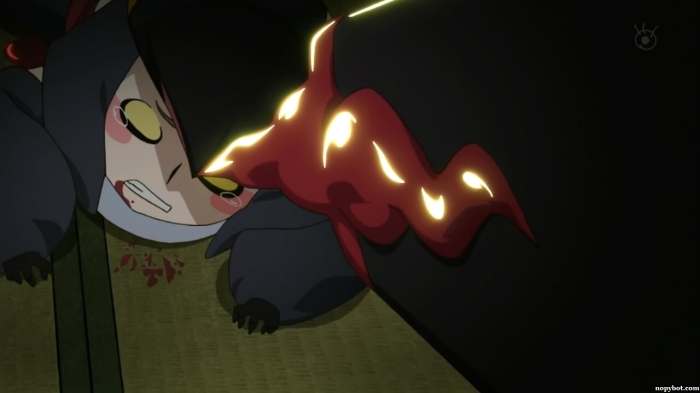
It got to the point where the Maniwa’s fates were sealed as soon as they ran up against any opponent whatsoever. Whenever I saw them confront another party I thought, “Yup, Maniwa’s gonna die.” This villain of the week being hyped up and immediately dying never, ever changed. It was already a given they would lose whatever fight they were in because it was a formula established by the narrative.
What even made it worse was that the Maniwa weren’t unsympathetic characters. Their comrades died like flies around them each episode, and they clearly bemoaned the loss off their friends. And yet, what did they do? They continued rushing into fights and dying. At one point a Maniwa asked another, “Your lover got killed in the last episode, aren’t you going to grieve for him?”. “No. Right now our job is more important.”. Said widow was dead a couple of episodes later. I was seriously wondering why they couldn’t let sleeping dogs lie and just give up on the sword hunt. But the answer was obvious. They were only following the path set out before them.
And then in the penultimate episode, Maniwa Houou, the leader of the Corps got possessed by an evil spirit and he slaughtered the whole Maniwa village. Then he got killed.
And it wasn’t even a folly of Houou’s actions that led to this, it was this random evil spirit that did everything. Houou hadn’t even been a factor. Even in the end the Maniwa remained irrelevant.
So basically everything the Maniwa did throughout the entire eleven episodes was meaningless.
Believing in an ideal, just because you like how it sounds.

In the book called Animal Farm, there’s this silver tongued bastard named Squealer. “Join the revolution, comrades”, he told all the rest of the animals, “And your lives will be better.” They believed and devoted themselves to the cause, and their lives became worse.
Ideals may sound good, and every human being has one somewhere in their heart, but there’s a difference between having an open mind and just following your ideal blindly. The animals in Animal Farm were blind. So is ISIS. And so is a lot of characters in Katanagatari. The Maniwa believed in their ideal, even when things were hopeless, even when they already knew they would probably end up dead, they still followed their goal of getting the swords and saving their Maniwa village. It probably sounded all rosy to them, but due to their inability to follow anything but the path they set in front of themselves, their unwillingness to break away from the roles the plot had given them, they continued doing what they were doing.
In the end their rigid ideal didn’t lead to anything. It was all meaningless.
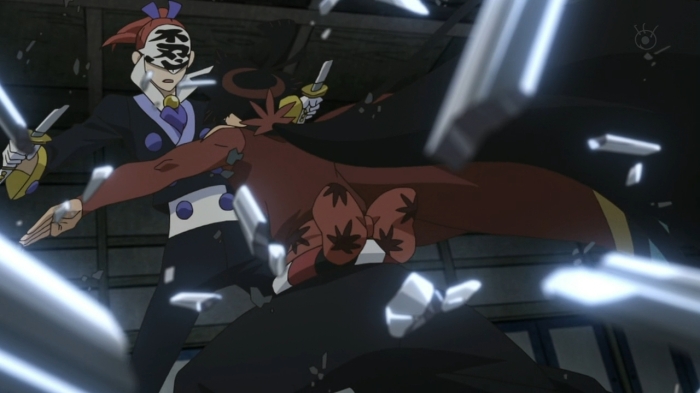
Sometimes we expect our lives to end up flowing as harmoniously as a storybook. The appropriate pacing, conflict, climax, resolution, all wrapped up in a neat little bow, as long we follow the story. Work hard, I’ll get this job. Talk to this girl, I’ll have a girlfriend. One plus one will always equal two. It’s a cute thought to hold, but in reality, real life doesn’t go that way. Just because you believe in something and hold to that belief religiously, doesn’t mean that belief will work out like you intended to. I’m not saying that it’s wrong to believe in anything. I’m saying that it’s wrong to believe in something rigidly. Don’t be swayed by the opinions of that belief alone. Let your own self come into play. You are your own storybook, not the book that others wrote for you to read.
And in a way, that what’s Katanagatari is trying to say, in its defying of narrative expectations. That a story doesn’t always follow a set formula, and that one would be a fool to trust that stories always work out the way you want them too. Often, events don’t follow a narrative. Often, events don’t have some grand higher purpose. Often, events are meaningless. Don’t follow a story. Just follow what you want to do.
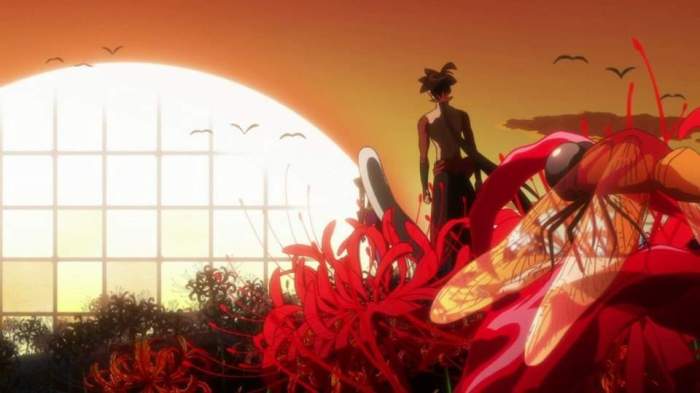
In the shocking ending that was episode 12, Togame confessed to Shichika that actuality that, this entire time throughout the entire series, she had been planning to kill him. Even though she loved him. Why? Because Shichika’s father killed her father. So naturally it was “her duty” to take revenge.
If she had just ignored the storybook inside her head, perhaps she would have been happier.